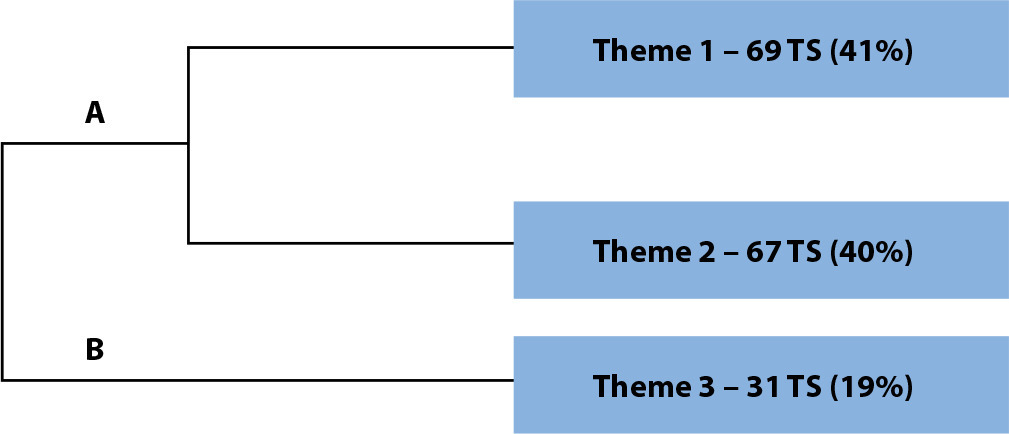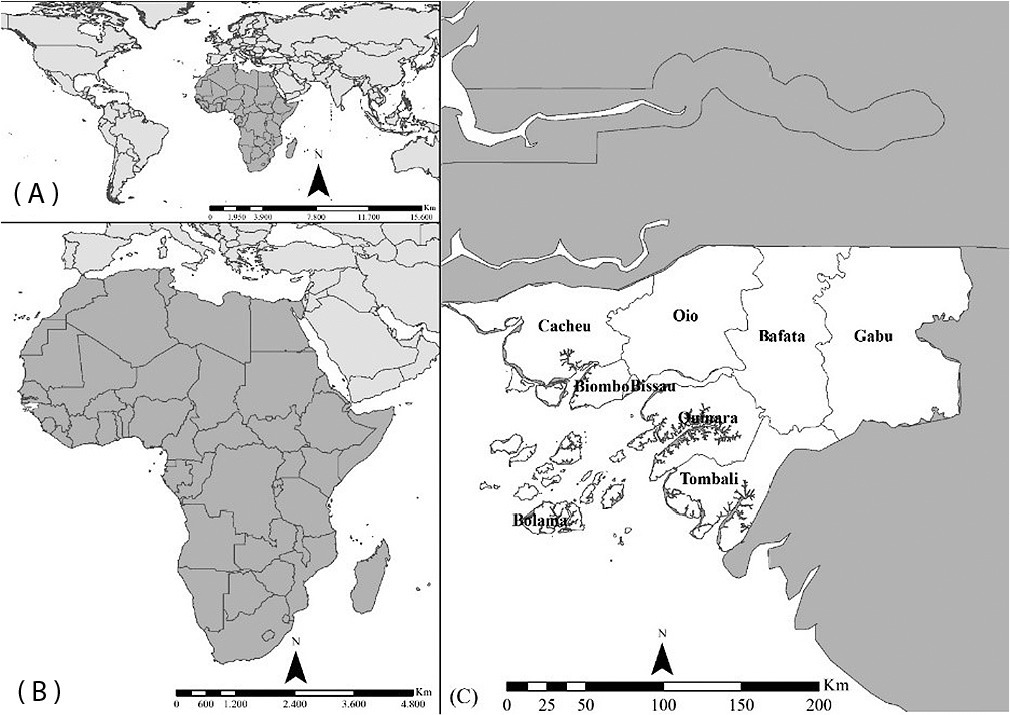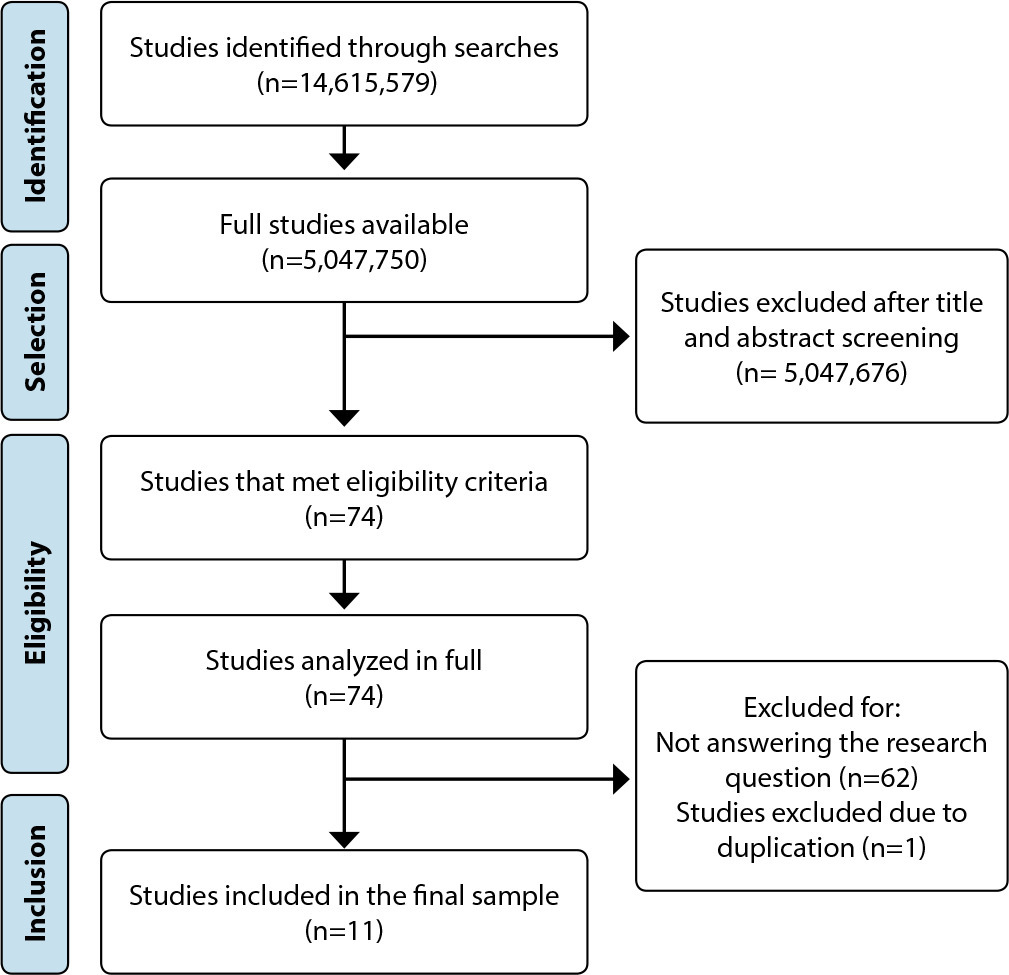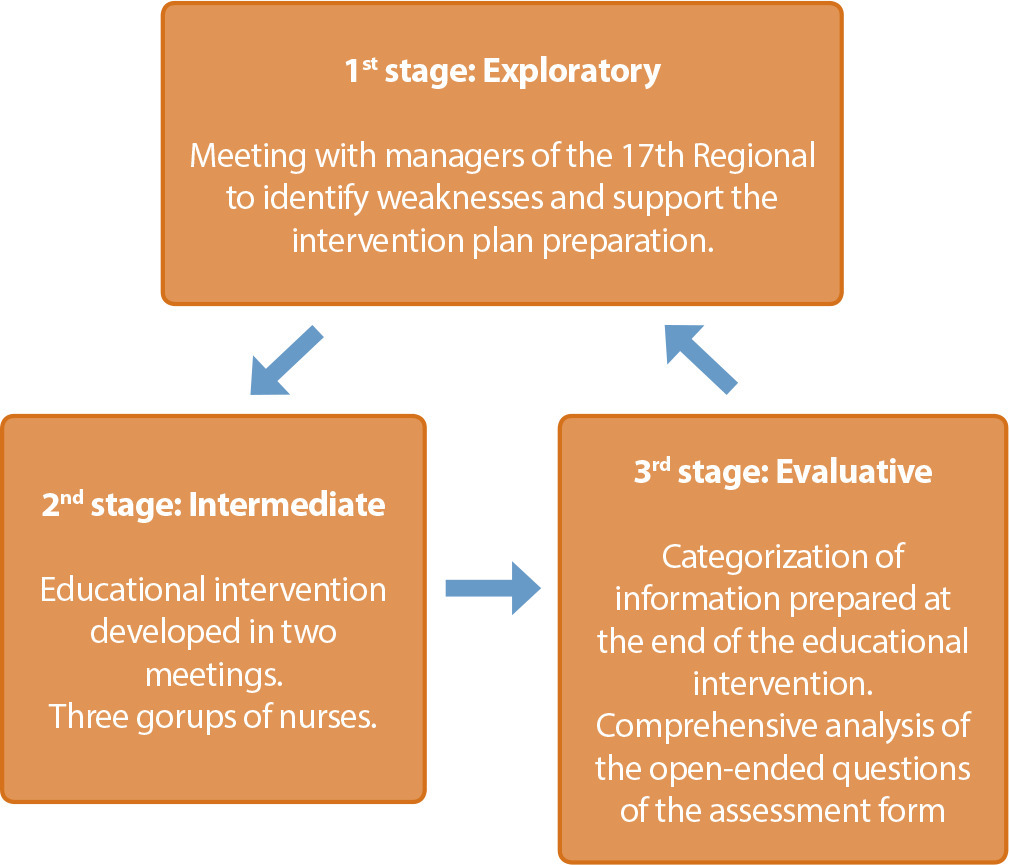-
ORIGINAL ARTICLE12-13-2024
Nurses’ experience regarding patient safety in mobile pre-hospital care
Revista Brasileira de Enfermagem. 2024;77(5):e20230529
Abstract
ORIGINAL ARTICLENurses’ experience regarding patient safety in mobile pre-hospital care
Revista Brasileira de Enfermagem. 2024;77(5):e20230529
DOI 10.1590/0034-7167-2023-0529
Views0See moreABSTRACT
Objectives:
to understand nurses’ experience regarding patient safety in mobile pre-hospital care.
Method:
a qualitative, exploratory and descriptive study, conducted with nurses active in mobile pre-hospital care services. Semi-structured interviews were conducted, audio-graved and submitted to Bardin’s content analysis.
Results:
from four thematic categories established, nurses reported the care and management skills necessary to work in this service. They demonstrated a commitment to ensuring safe care for patients, staff and spectators. They highlighted the actions taken to prevent and mitigate incidents. However, they based their experiences on practice protocols and individual actions, expressing the need to improve knowledge about patient safety.
Final Considerations:
mobile pre-hospital care nurses’ experience in relation to patient safety was limited, suggesting the need for training on the subject, alignment of work processes and implementation of strategies, aiming to guarantee safe care.
-
ORIGINAL ARTICLE12-13-2024
Repercussions of the pandemic on tuberculosis control actions from the perspective of health professionals
Revista Brasileira de Enfermagem. 2024;77(5):e20230477
Abstract
ORIGINAL ARTICLERepercussions of the pandemic on tuberculosis control actions from the perspective of health professionals
Revista Brasileira de Enfermagem. 2024;77(5):e20230477
DOI 10.1590/0034-7167-2023-0477
Views0See moreABSTRACT
Objectives:
to analyze the repercussions of the COVID-19 pandemic on tuberculosis control actions from the perspective of primary health care professionals.
Methods:
this descriptive study with a qualitative approach was conducted from November 2022 to April 2023, using semi-structured interviews with 11 key informant professionals from primary health care units in a Brazilian capital. Data were organized using Atlas.ti 22.0 software and subjected to thematic-categorical content analysis.
Results:
the pandemic scenario caused alterations in the work process, necessitating abrupt adaptations, and led to detrimental impacts on the health of professionals and tuberculosis control actions, which were reduced or discontinued.
Final Considerations:
there was evident unpreparedness and a lack of resources from various governmental levels and health services to handle the public health emergency situation without severe harm to the provision of essential services.
-
Training of Brazilian indigenous nurses: between human rights, valuing diversity and inclusion
Revista Brasileira de Enfermagem. 2024;77(5):e20230430
Abstract
Training of Brazilian indigenous nurses: between human rights, valuing diversity and inclusion
Revista Brasileira de Enfermagem. 2024;77(5):e20230430
DOI 10.1590/0034-7167-2023-0430
Views0See moreABSTRACT
Objectives:
to analyze the possibilities and potential of training indigenous nurses, given the Brazilian Health System (SUS), understanding the relationships between education and health.
Methods:
theoretical-reflective study, based on scientific literature, aligned with the experience, critical thinking of its authors and the Sustainable Development Goals in Brazil.
Results:
this text articulates three axes: Potential for including indigenous students in nursing training; Paths to achieving equity through inclusion and retention policies for indigenous students at different levels; and Implications of this for the SUS and global health.
Final Considerations:
indigenous students, beneficiaries of affirmative actions, face challenges of inclusion and retention in public universities that directly impact their academic training. Added to this are the difficulties identified in basic education, professor training and implementation of permanence policies, with consequences for services and training at other levels.
-
ORIGINAL ARTICLE12-13-2024
Interobserver agreement in Reception and Risk Stratification in Obstetrics implementation
Revista Brasileira de Enfermagem. 2024;77(5):e20230361
Abstract
ORIGINAL ARTICLEInterobserver agreement in Reception and Risk Stratification in Obstetrics implementation
Revista Brasileira de Enfermagem. 2024;77(5):e20230361
DOI 10.1590/0034-7167-2023-0361
Views0See moreABSTRACT
Objectives:
to analyze interobserver agreement in the Reception and Risk Stratification in Obstetrics protocol implementation.
Methods:
a cross-sectional study carried out during Reception and Risk Stratification in Obstetrics implementation, conducted in a tertiary hospital in southern Brazil with 891 participants in January 2020. Descriptive and interobserver agreement analysis was carried out using the Kappa coefficient in the risk stratification assigned by the triage nurse and reviewed by the researcher.
Results:
around half of the calls (55.6%) were stratified as not very urgent (green), followed by urgent (yellow) (31.8%), very urgent (orange) (9.3%), not urgent (blue) (3.4%) and no emerging stratification (red). Agreement analysis of revised stratification found Kappa values of 0.20 (blue), 0.54 (green), 0.77 (yellow) and 0.80 (orange).
Conclusions:
most appointments were non-urgent. The agreement analysis between the revised and assigned risk stratification revealed greater interobserver agreement as the priority level increased.
-
ORIGINAL ARTICLE12-13-2024
Adaptation and implementation of a Nursing care protocol for children in the Amazon Region
Revista Brasileira de Enfermagem. 2024;77(5):e20230245
Abstract
ORIGINAL ARTICLEAdaptation and implementation of a Nursing care protocol for children in the Amazon Region
Revista Brasileira de Enfermagem. 2024;77(5):e20230245
DOI 10.1590/0034-7167-2023-0245
Views0See moreABSTRACT
Objectives:
to describe the process of implementing an adapted protocol for pediatric nursing care in a health unit located in a municipality in the Amazon Region.
Methods:
methodological research conducted in a basic health unit with four family health teams in the state of Rondônia, involving seven nursing professionals. Data collection occurred between October 2020 and April 2022, following the research phases: situational diagnosis, exploratory phase, protocol definition, implementation, and evaluation.
Results:
the outcome was the adaptation and implementation of a nursing care protocol for children.
Final Considerations:
the adaptation and implementation process can be an effective approach to improving care, strengthening nursing as a profession with a solid foundation in scientific and clinical evidence. This facilitates early problem identification and appropriate guidance, leading to better health outcomes for children.
-
ORIGINAL ARTICLE12-13-2024
Nurses’ experiences in caring for people with mental health problems hospitalized due to clinical comorbidities
Revista Brasileira de Enfermagem. 2024;77(5):e20230136
Abstract
ORIGINAL ARTICLENurses’ experiences in caring for people with mental health problems hospitalized due to clinical comorbidities
Revista Brasileira de Enfermagem. 2024;77(5):e20230136
DOI 10.1590/0034-7167-2023-0136
Views0See moreABSTRACT
Objectives:
to understand nurses’ experiences in caring for people with mental health problems hospitalized due to clinical comorbidities in non-psychiatric Inpatient Units.
Methods:
qualitative study, guided by Alfred Schutz’s social phenomenology. Sixteen phenomenological interviews were conducted. The content was analyzed and discussed based on the literature, through the composition of three categories of analysis.
Results:
three categories emerged in the study: Challenges in care faced by nurses; Fragmented care action; and Ideal care. The disarticulation of the clinic was revealed, as described by nurses, showing care as an action far removed from the comprehensiveness of a person. Nurses’ performance is guided predominantly by biomedical reference, disregarding appreciation of subjectivity.
Final Considerations:
it was observed that nurses attribute the responsibility for patient care to factors external to their life-world, when, in fact, these aspects should be components that help them in comprehensive care construction.
-
REVIEW11-29-2024
Assessment of knowledge in oncology about care for transgender people: a scoping review
Revista Brasileira de Enfermagem. 2024;77:e20230532
Abstract
REVIEWAssessment of knowledge in oncology about care for transgender people: a scoping review
Revista Brasileira de Enfermagem. 2024;77:e20230532
DOI 10.1590/0034-7167-2023-0532
Views0ABSTRACT
Objective:
to identify evidence available in the literature on instruments and methodologies used to assess healthcare professionals’ knowledge about cancer care for the transgender population.
Methods:
a scoping review was conducted in seven databases, including studies that answered the question: what is the healthcare professionals’ level of knowledge about cancer care for the transgender population?
Results:
forty-one articles were selected that dealt specifically with healthcare professionals’knowledge in relation to care for the LGBTQIAPN+ population, especially the transgender population. Eighteen studies assessed patients’ perceptions of professionals’knowledge, whereas other studies used their own assessment tools, considering the global context of LGBTQIAPN+ health.
Conclusions:
there is no tested and validated instrument that assesses the knowledge about the transgender population’s oncological health, highlighting the need to construct and validate an instrument focused on this population’s needs.
Keywords:Health Services for Transgender PeopleNeoplasmsOncologyProfessional TrainingTransgender PeopleSee more
-
EDITORIAL01-01-2016
Discoveries of Biological Sciences and their implications for nursing practice
Revista Brasileira de Enfermagem. 2016;69(4):619-620
Abstract
EDITORIALDiscoveries of Biological Sciences and their implications for nursing practice
Revista Brasileira de Enfermagem. 2016;69(4):619-620
DOI 10.1590/0034-7167.2016690401i
Views1For the longest time, the production of knowledge in the field of biological sciences was viewed as the exclusive responsibility and competence of medical professionals. This scenario has changed in light of the worldwide trend of improvements in other health professions, which includes the need to implement the use of evidence-based methodology in nursing practice. […]See more -
EDITORIAL01-01-2016
Descobertas das Ciências Biológicas e as implicações para a prática da Enfermagem
Revista Brasileira de Enfermagem. 2016;69(4):619-620
Abstract
EDITORIALDescobertas das Ciências Biológicas e as implicações para a prática da Enfermagem
Revista Brasileira de Enfermagem. 2016;69(4):619-620
DOI 10.1590/0034-7167.2016690401i
Views0A produção de conhecimento na área das ciências biológicas, durante muito tempo, foi vista como de responsabilidade e competência exclusivamente de profissionais médicos. Esse cenário alterou-se frente à tendência mundial de aperfeiçoamento dos demais profissionais de saúde, incluindo-se a necessidade de se concretizar a utilização da metodologia da prática baseada em evidência na atuação do […]See more -
REVIEW01-01-2016
Effects from acupuncture in treating anxiety: integrative review
Revista Brasileira de Enfermagem. 2016;69(3):602-609
Abstract
REVIEWEffects from acupuncture in treating anxiety: integrative review
Revista Brasileira de Enfermagem. 2016;69(3):602-609
DOI 10.1590/0034-7167.2016690325i
Views0See moreABSTRACT
Objective:
to evaluate the scientific evidence that is available in the literature on the effects of acupuncture for treating anxiety and on the quality of such studies.
Method:
the study is an integrative review of CINAHL, LILACS, PUBMED-PICO, SciELO, and The Cochrane Library between 2001 and 2014. Keywords anxiety, acupuncture therapy, acupuncture, and anxiety disorders were combined among themselves to ensure a wide search of primary studies.
Results:
among 514 articles, 67 were selected to be fully read and 19 were included. Among these, 11 were found to have strong evidence levels. Among the six articles about randomized clinical studies, five were found to be of reasonable quality. Two studies used acupuncturist nurses to perform their interventions. Its results showed positive and statistically significant effects from using acupuncture for treating subjects with anxiety.
Conclusion:
acupuncture seems to be a promising treatment for anxiety; however, there is a need for improving the methodological quality of the research on this field.
-
REVIEW01-01-2016
Palliative care and spirituality: an integrative literature review
Revista Brasileira de Enfermagem. 2016;69(3):591-601
Abstract
REVIEWPalliative care and spirituality: an integrative literature review
Revista Brasileira de Enfermagem. 2016;69(3):591-601
DOI 10.1590/0034-7167.2016690324i
Views0See moreABSTRACT
Objective:
to analyze scientifi c articles published in international online journals about palliative care and spirituality.
Methods:
an integrative literature review with data collected in September 2014 from the LILACS, SCIELO, MEDLINE/PubMed, and IBECS databases.
Results:
thirty-nine publications were identifi ed and their textual analysis facilitated through four thematic approaches: the meaning of spirituality in the context of palliative care; palliative care and spiritual support; spirituality and relief of pain and other symptoms in patients under palliative care; and instruments to evaluate the spiritual dimension of the scope of palliative care.
Conclusion:
this study examined the relevance of the spiritual dimension in the care of patients with palliative care and the need for developing new studies to disseminate knowledge about this topic.
Descriptors:
Palliative Care; Palliative Care at End of Live; Spirituality; Religion; Health.
-
REVIEW01-01-2016
Educational technologies to encourage (self) care in postpartum women
Revista Brasileira de Enfermagem. 2016;69(3):582-590
Abstract
REVIEWEducational technologies to encourage (self) care in postpartum women
Revista Brasileira de Enfermagem. 2016;69(3):582-590
DOI 10.1590/0034-7167.2016690323i
Views0See moreABSTRACT
Objective:
to evaluate national and international literature regarding the use of educational technologies to encourage self care in postpartum women.
Method:
an integrative review of the literature. The articles were collected from the CINAHL, SCOPUS, PubMed, SciELO, LILACS and Cochrane databases; the time period for the articles referred to January/2004 to July/2014; the languages used in the articles were Portuguese, English, Spanish and French; the articles were selected from the following descriptors: postpartum care period, educational technology, nursing and self care. Twenty-seven articles were selected for analysis
Results:
based on the information found, the scales, counseling and home visits were among the most recommended educational technologies.
Conclusion:
the technologies promote communication, but are sometimes dependent on computer and internet access, which hinder their use by low-income women.

-
RESEARCH01-01-2016
Patients with HIV/Aids and ulcer risk: nursing care demands
Revista Brasileira de Enfermagem. 2016;69(3):574-581
Abstract
RESEARCHPatients with HIV/Aids and ulcer risk: nursing care demands
Revista Brasileira de Enfermagem. 2016;69(3):574-581
DOI 10.1590/0034-7167.2016690322i
Views0See moreABSTRACT
Objective:
to analyze the demand for nursing care and the risk of pressure ulcers (PU) of patients with HIV/Aids.
Method:
quantitative survey, carried out from December 2012 to March 2013 in a public hospital of Teresina, state of Piauí, Brazil.
Results:
the sample of 31 patients was predominantly male, mean age 36.6 years, average care demand 49.4%, most showing some risk of developing PU. The variables correlated with PU risk were care demand and clinical outcome (death). Those associated with care demand were age and clinical outcome (death).
Conclusion:
the results showed that patients require moderate nursing care needs and most of them present risk of developing PU.

-
ORIGINAL ARTICLE10-09-2023
Construction and validation of a scenario for recognizing sepsis by nursing students: a methodological study
Revista Brasileira de Enfermagem. 2023;76(4):e20220537
Abstract
ORIGINAL ARTICLEConstruction and validation of a scenario for recognizing sepsis by nursing students: a methodological study
Revista Brasileira de Enfermagem. 2023;76(4):e20220537
DOI 10.1590/0034-7167-2022-0537
Views0See moreABSTRACT
Objective:
To build and validate a clinical simulation scenario for teaching Nursing students about early recognition of signs and symptoms of sepsis in the context of the emergency unit.
Methods:
Methodological study developed in two phases: construction of a simulated scenario and content validation by expert judges. For data analysis, the Content Validity Index (CVI) was calculated considering agreement equal to or greater than 80%. The minimum acceptable CVI value for scenario validation was 1.0.
Results:
The simulation scenario proved to be appropriate, with a global Content Validity Index equal to 1. Some adjustments related to the clarity of the wording were necessary, as suggested by the judges. Conclusions: A medium-complexity, high-fidelity scenario was successfully constructed and validated for teaching early recognition of sepsis signs and symptoms.
-
EXPERIENCE REPORT10-09-2023
Service organization protocol for coping with undergraduate students’ psychological distress: a collective construction
Revista Brasileira de Enfermagem. 2023;76(4):e20220535
Abstract
EXPERIENCE REPORTService organization protocol for coping with undergraduate students’ psychological distress: a collective construction
Revista Brasileira de Enfermagem. 2023;76(4):e20220535
DOI 10.1590/0034-7167-2022-0535
Views0See moreABSTRACT
Objective:
to report on the experience of the elaboration process of a service organization protocol for coping with public undergraduate students’ psychological distress in the countryside of São Paulo.
Method:
experience report on protocol production, an action research product, carried out according to the health care and service organization protocol model, made possible by remote meetings with 33 professionals linked to the management and services of the university’s health and social assistance departments.
Results:
collective protocol production provided an opportunity for an institutional agreement on educational, therapeutic and support actions, to be developed in groups or individually with students, with provision for permanent education with civil servants.
Final considerations:
this experience made it possible to list specific actions to face undergraduate students’ psychological distress, bringing health professionals closer to those in management, promoting the exchange of concepts and practices to re-signify and transform the work developed.
-
ORIGINAL ARTICLE10-09-2023
Performance of Family Health Strategy Nurses in LGBT+ Healthcare
Revista Brasileira de Enfermagem. 2023;76(4):e20220514
Abstract
ORIGINAL ARTICLEPerformance of Family Health Strategy Nurses in LGBT+ Healthcare
Revista Brasileira de Enfermagem. 2023;76(4):e20220514
DOI 10.1590/0034-7167-2022-0514
Views0See moreABSTRACT
Objective:
To analyze the role of Family Health Strategy (FHS) nurses in the health care of LGBT+ individuals.
Methods:
This qualitative study is based on Institutional Analysis. Data was collected in August 2021 through semi-structured interviews with 14 Family Health Strategy nurses from municipalities in the state of São Paulo. The data was processed using the IRaMuTeQ® software and analyzed lexically.
Results:
The textual corpus gave rise to three themes, which addressed the nurses’ practice, the difficulties and challenges they face in providing care to LGBT+ individuals, and the direct association of LGBT+ individuals with sexually transmitted infections.
Conclusion:
Lack of preparedness, access to information, and the need for expanded listening skills are still gaps in the performance of FHS nurses in caring for LGBT+ individuals. However, fostering acceptance and building strong relationships have been effective strategies in bridging the gap in nursing care for the LGBT+ community.

-
ORIGINAL ARTICLE10-09-2023
Perceived stress by mototaxi drivers and its relationship with sociodemographic and occupational characteristics
Revista Brasileira de Enfermagem. 2023;76(4):e20220505
Abstract
ORIGINAL ARTICLEPerceived stress by mototaxi drivers and its relationship with sociodemographic and occupational characteristics
Revista Brasileira de Enfermagem. 2023;76(4):e20220505
DOI 10.1590/0034-7167-2022-0505
Views0See moreABSTRACT
Objective:
To investigate the association of sociodemographic and occupational characteristics with a high level of perceived stress in motorcycle taxi drivers.
Method:
Cross-sectional study carried out with motorcycle taxi drivers who answered instruments on sociodemographic and occupational variables – Perceived Stress Scale, Job Content Questionnaire and Effort-Reward Imbalance. Descriptive statistics, Pearson’s chi-square test and Poisson regression with robust variance were used. Statistical significance was 5%.
Results:
Of the 800 motorcycle taxi drivers, 46.8% had a high level of perceived stress. In the multivariate analysis, a high level of stress was associated with low control over work (PR=7.76; 95%CI=5.19-11.61), low social support at work (PR=3.87; 95%CI =2.95 5.08), working hours longer than eight hours a day (RP=1.47; 95%CI=1.21-1.78) and monthly income less than or equal to two minimum wages (PR=1.34;95%CI=1.13-2.58).
Conclusion:
Long working hours, occupational stressors and low income were associated with a high level of perceived stress. Public policies and interventions to minimize occupational stressors are essential.
-
ORIGINAL ARTICLE10-09-2023
Spatial and temporal analysis of tuberculosis incidence in Guinea-Bissau, 2018 to 2020
Revista Brasileira de Enfermagem. 2023;76(4):e20220481
Abstract
ORIGINAL ARTICLESpatial and temporal analysis of tuberculosis incidence in Guinea-Bissau, 2018 to 2020
Revista Brasileira de Enfermagem. 2023;76(4):e20220481
DOI 10.1590/0034-7167-2022-0481
Views0See moreABSTRACT
Objective:
to analyze the epidemiological profile, spatial and temporal distribution of tuberculosis in Guinea-Bissau from 2018 to 2020.
Methods:
an ecological study, carried out in Guinea-Bissau, considering new cases of tuberculosis. Spatial analysis of areas was used to verify tuberculosis distribution in the country, and time series were used to identify incidence evolution over the years of study.
Results:
a total of 6,840 new cases of tuberculosis were reported. Tuberculosis incidence rate in the country ranged from 36.8 to 267.7 cases/100,000 inhabitants, with emphasis on the regions of Bissau and Biombo (over 90 cases/100,000). By using time series, it was possible to observe an increase in case incidence over the years of study.
Conclusions:
the study made it possible to identify the epidemiological profile of tuberculosis in Guinea-Bissau, spatial distribution heterogeneity, in addition to identifying the disease evolution over the years of investigation.

-
ORIGINAL ARTICLE10-09-2023
Eating habits: what foods do children between 12 and 36 months consume?
Revista Brasileira de Enfermagem. 2023;76(4):e20220393
Abstract
ORIGINAL ARTICLEEating habits: what foods do children between 12 and 36 months consume?
Revista Brasileira de Enfermagem. 2023;76(4):e20220393
DOI 10.1590/0034-7167-2022-0393
Views0See moreABSTRACT
Objective:
to identify toddlers’ eating habits.
Method:
a cross-sectional study of quantitative analysis, with a sample of 808 toddlers who attended day care centers in the district of Viseu, Portugal, between November 2018 and September 2019. Data were collected using a questionnaire directed at parents.
Results:
the prevalence of children who ate six meals a day was 42.8%, and 42.5%, those who ate five meals. It was found that 2.0% of children consumed chocolates, 1.0%, desserts, and 0.4%, carbonated beverages, daily. On average, dairy product (M=5.61; SD=2.62) and meat/fish/egg (M=4.80; SD=3.57) consumption was higher than recommended, while fat (M=0.48; SD=0.40), legume (M=0.49; SD=0.45), vegetable (M=1.18; SD=0.87) and water (M=0 .51; SD=0.29) consumption was lower.
Conclusions:
there was a higher or lower consumption than recommended for some foods, highlighting the need to implement nursing intervention programs aimed at promoting healthy eating habits in toddlers and families.
-
REVIEW10-09-2023
Self-care guidelines for patients in the post-hematopoietic stem cell transplantation period: a scoping review
Revista Brasileira de Enfermagem. 2023;76(4):e20220383
Abstract
REVIEWSelf-care guidelines for patients in the post-hematopoietic stem cell transplantation period: a scoping review
Revista Brasileira de Enfermagem. 2023;76(4):e20220383
DOI 10.1590/0034-7167-2022-0383
Views0ABSTRACT
Objective:
To map the evidence on self-care guidelines for patients in the post-hematopoietic stem cell transplantation (HSCT) period.
Method:
Scoping review supported by Joanna Briggs Institute recommendations, with searches conducted between March and April 2022 in national and international databases and repositories of theses and dissertations.
Results:
Of the 11 studies that composed the final sample, the guidelines had a social and personal aspect, as post-transplant patients need to follow numerous essential recommendations for the prevention of infections and complications for successful treatment and improved quality of life.
Conclusion:
Knowing the self-care guidelines that must be performed by post-HSCT patients is fundamental for the nursing team to provide the necessary information for care outside the controlled environment of the hospital, in addition to minimizing episodes of infection, death, and increasing the survival and quality of life of transplant recipients.
Keywords:Health EducationHematopoietic Stem Cell TransplantationNursing CarePatient Discharge SummariesSelf-CareSee more
Search
Search in:
Nuvem de Tags
Aged (144) Atenção Primária à Saúde (239) COVID-19 (104) Cuidados de Enfermagem (269) Educação em Enfermagem (151) Educação em Saúde (139) Enfermagem (930) Estudos de Validação (131) Health Education (144) Idoso (208) Mental Health (149) Nursing (987) Nursing Care (306) Patient Safety (151) Primary Health Care (284) Qualidade de Vida (104) Quality of Life (106) Saúde Mental (145) Segurança do Paciente (150) Validation Studies (108)




